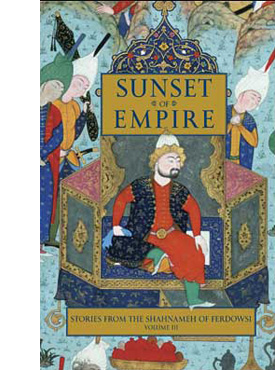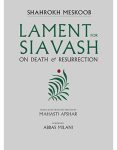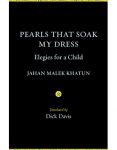About the Book
Among the masterpieces of world literature, perhaps the least familiar to English readers is the Persian Book of Kings (Shahnameh, in Persian). This prodigious national epic, composed by the poet Ferdowsi between 980 and 1010, tells the story of ancient Persia, beginning in the mythic time of Creation and continuing forward to the Arab-Islamic invasion.
With our third and final volume of stories from the Shahnameh we move from mythology and legend to romanticized history. Here the mighty events that shook ancient Persia from the time of Alexander of Macedon’s conquest to the Arab invasion of the seventh century C.E. are reflected in the stirring and poignant narratives of Ferdowsi, the master poet who took on himself the task of preserving his country’s great pre-Islamic heritage. We see vast empires rise and fall, the rule of noble kings and cruel tyrants, the fortunes of a people buffeted by contending tides of history. Larger than life individuals are vividly depicted—the impulsive, pleasure-loving king Bahram Gur, the wise vizier Bozarjmehr, the brave rebel Bahram Chubineh, his loyal defiant sister Gordyeh, and many others—but we also see many vignettes of everyday life in the villages and towns of ancient Persia, and in this part of the Shahnameh Ferdowsi indulges his talent for sly humor much more than in the earlier tales. The poem rises to its magnificent climax in its last pages, when the tragic end of an era is recorded and Ferdowsi and his characters look with foreboding towards an unstable and fearful future.
Breathtaking miniatures from the finest Persian Shahnameh manuscripts of the sixteenth and seventeenth centuries, many of them published here for the first time, heighten the emotional impact of the text.
Excerpt
Tale of Contents
- Introduction 7
- The Story of Darab and the Fuller 15
- Sekandar’s Conquest of Persia 33
- The Reign of Sekandar 51
- The Ashkanians 119
- The Reign of Ardeshir 151
- The Reign of Shapur, Son of Ardeshir 175
- The Reign of Shapur Zu’l Aktaf 179
- The Reign of Yazdegerd the Unjust 203
- The Reign of Bahram Gur 239
- The Story of Mazdak 305
- The Reign of Kesra Nushin-Ravan 312
- The Reign of Hormozd 353
- The Reign of Khosrow Parviz 417
- Ferdowsi’s Lament for the Death of His Son 441
- The Story of Khosrow and Shirin 461
- The Reign of Yazdegerd 489
- Glossary of Names and Their Pronunciation 514
- Credits and Acknowledgments 523
- Guide to the Illustrations 523
The Story of Kebrui;
Bahram Forbids the Drinking of Wine
At dawn the next morning Bahram called for wine, and his courtiers began another round of merry-making. At that moment the headman of a village entered with a present of fruit: he brought camel-loads of pomegranates, apples and quinces, and also bouquets of flowers fit for the royal presence. The king welcomed this man, who had the ancient, noble name of Kebrui, and motioned him to a place among the young men there. He handed him a large goblet of wine, that held two maund. The visitor was pleased at the king’s and his courtiers’ attention, and when he had drained the cup, he caught sight of another and felt a craving for it in his heart. In front of all the nobles there he reached out and seized it. He stood and toasted the king, and said, “I’m a wine-drinker, and Kebrui is my name. This goblet holds five maund of wine, and I’m going to drain it seven times in front of this assembly. Then I’ll go back to my village, and no one will hear any drunken shouts from me.” And to the astonishment of the other drinkers there he drained the huge cup seven times.
With the king’s permission he left the court, to see how the wine would work in him. As he started back on his journey across the plain, the wine began to take effect. He urged his horse forward, leaving the crowd who were accompanying him behind, and rode to the foothills of a mountain. He dismounted in a sheltered place and went to sleep in the mountain’s shadow. A black raven flew down from the mountain and pecked out his eyes as he slept. The group that had been following along behind found him lying dead at the foot of the mountain, with his eyes pecked away and his horse standing nearby at the roadside. His servants, who were part of the group, began wailing and cursed the assembly and the wine.
When Bahram awoke from sleep, one of his companions came to him and said, “Kebrui’s bright eyes were pecked out by a raven while he was drunk at the foot of a mountain.” The king’s face turned pale, and he grieved for Kebrui’s fate. Immediately he sent a herald to the palace door to announce: “My lords, all who have glory and intelligence! Wine is forbidden to everyone throughout the world, both noblemen and commoners alike.”
The Story of the Cobbler’s Son and the Lion:
Wine Is Declared Permissible
A year passed, and wine remained forbidden. No wine was drunk when Bahram assembled his court, or when he asked for readings from the books that told of ancient times. And so it was, until a shoemaker’s son married a rich, wellborn, and respectable woman. But the shoemaker’s boy’s awl was not hard enough for its task, and his mother wept bitterly. She had a little wine hidden away; she brought her son back to her house and said to him,
- “Drink seven glasses of this wine, and when
- You feel you’re ready, go to her again:
- You’ll break her seal once you two are alone—
- A pickax made of felt can’t split a stone.”
The boy drank seven glasses down, and then an eighth, and the fire of passion flared up in him immediately. The glasses made him bold, and he went home and was able to open the recalcitrant door; then he went back to his parents’ house well pleased with himself. It happened that a lion had escaped from the king’s lion-house and was wandering in the roads. The cobbler’s son was so drunk that he couldn’t distinguish one thing properly from another; he ran out and sat himself on the roaring lion’s back, and hung on by grasping hold of the animal’s ears. The lion keeper came running with a chain in one hand and a lariat in the other and saw the cobbler’s son sitting on the lion as unconcernedly as if he were astride a donkey. He ran to the court and told the king what he had seen, which was a sight no one had ever heard of before. The king was astonished and summoned his advisors. He said to them, “Inquire as to what kind of a man this cobbler is.” While they were talking, the boy’s mother ran in and told the king what had happened.
- She said to him, “May you live happily
- As long as time endures, your majesty!
- This boy of mine’s just starting out on life—
- He’d found himself a satisfactory wife.
- But when the time came . . . well, his implement
- Was just too soft, and he was impotent.
- So then I gave the boy (but privately,
- To make him father of a family)
- Three glasses of good wine; at once his face
- Shone with a splendid ruby’s radiant grace,
- The floppy felt stirred, lifted up its head,
- And turned into a strong, hard bone instead.
- Three drafts of wine gave him his strength and glory
- Who would have thought the king would hear the story?”
The king laughed at the old woman’s words and said, “This story is not one to hide!” He turned to his chief priest and said, “From now on wine is allowed again. When a man drinks he must choose to drink enough so that he can sit astride a lion without the lion trampling him, but not so much that when he leaves the king’s presence a raven will peck his eyes out.” Immediately a herald announced at the palace door, “My lords who wear belts made of gold! A man may drink wine as long as he looks to how the matter will end and is aware of his own capacity. When wine leads you to pleasure, see that it does not leave your body weak and incapable.”
About the Author
About the Translator
Dick Davis brings a unique array of gifts to the challenges of translating Hafez and his contemporaries. In his own right, he is a poet of great technical accomplishment and emotional depth. He is also the foremost English-speaking scholar of medieval Persian poetry now working in the West. Numerous honors testify to his talents. In the U.K., he received the Royal Society of Literature’s Heinemann Award for his second book of poems, Seeing the World, in 1981; his Selected Poems was chosen by both the Sunday Times and the Daily Telegraph as a Book of the Year in 1989; and his collection Belonging was selected as the Poetry Book of the Year by The Economist in 2003. In the U.S., A Kind of Love—the American edition of his Selected Poems—received the Ingram Merrill prize for “excellence in poetry” in 1993. He has received awards for his scholarship from the Arts Council of Great Britain, The British Institute of Persian Studies, and the Guggenheim Foundation, and he is the recipient of grants for his translations from the National Endowment for the Humanities and the National Endowment for the Arts. Twice, in 2000 and 2001, he received the Translation Award of the International Society for Iranian Studies, and in 2001 he received an Encyclopedia Iranica award for “services to Persian poetry.” His translation of Ferdowsi’s Shahnameh: the Persian Book of Kings was chosen as one of the “ten best books of 2006” by the Washington Post.
Davis read English at Cambridge, lived in Iran for eight years (he met and married his Iranian wife Afkham Darbandi there), then completed a PhD in Medieval Persian Literature at the University of Manchester. He has resided for extended periods in both Greece and Italy (his translations include works from Italian), and has taught at both the University of California and at Ohio State University, where he was for nine years Professor of Persian and Chair of the Department of Near Eastern Languages, retiring from that position in 2012. In all, he has published more than twenty books and is a Fellow of the Royal Society of Literature.
Among the qualities that distinguish his poetry and scholarship are exacting technical expertise and wide cultural sympathy—an ability to enter into distant cultural milieus both intellectually and emotionally. In choosing his volume of poems Belonging as a “Book of the Year” for 2006, The Economist praised it as “a profound and beautiful collection” that gave evidence of “a commitment to an ideal of civilized life shared by many cultures.” the Times Literary Supplement has called him “our finest translator of Persian poetry.” In 2009 Mage published a book of Dick Davis’s own poems about Iran: At Home and Far From Home: Poems on Iran and Persian Culture. His book about the Shahnameh, Epic and Sedition was published by Mage in paperback in 2006. His books of translations are: Borrowed Ware: Medieval Persian Epigrams (1998), The Shahnameh (2004); The Legend of Seyavash (2004); Rostam: Tales of Love and War from Persia’s Book of Kings (2007); Vis and Ramin (2008); Faces of Love: Hafez and the Poets of Shiraz (2012).









